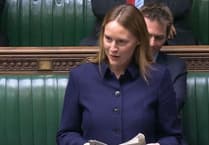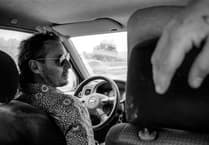Once again my name didn’t quite make it to the New Year Honours list.
Never mind, there’s always the Birthday Honours and then next New Year.
To be honest I am not in the least bit surprised; I haven’t done anything to remotely deserve that sort of recognition.
However, I congratulate all those here in Devon and Cornwall who did get a mention.
I always look forward to seeing if I know any of the names on the list.
A few years ago, a former colleague of mine received the MBE for his voluntary work with the Dartmoor Rescue Group. It was richly deserved and we were all thrilled for him.
Many of the people I interviewed during my time at the BBC went on to receive honours, people such as Melissa Mead from Cornwall. She received an MBE back in 2019.
I had interviewed Melissa on BBC Spotlight several times after her young son died of sepsis.
She fought a tireless campaign to raise greater awareness of the illness. I was always in awe of her strength and determination whilst at the same time coping with raw and painful grief.
Her campaigning has undoubtedly helped other families avoid a similar tragedy.
This year I watched the television report about the latest honours awarded here in the South West and once again many deserving people have been recognised.
They include an amazing couple from Plymouth who are foster carers. They have helped more than 60 children who, for various reasons, have had to move out of their own family homes.
Their devotion and desire to help others shone through as they were interviewed about their MBEs.
It is stories such as these that have helped me to cling on to the belief that we should still have an honours system.
But, like many other people, my faith in the way the honours system works has been severely tested of late.
While people such as those foster carers in Plymouth were rightly rewarded for their work, we were also being told about the people the former, and very brief Prime Minister, Liz Truss has rewarded in her resignation honours.
The very phrase “resignation honours” seems to be a contradiction in terms.
Liz Truss was in office for fewer than 50 days. Much of that time government business was severely curtailed because of mourning for the late Queen.
What significant improvement to the lives of people in the UK would have been achieved in that time?
Indeed, many argue that Liz Truss did more harm than good during her very brief time in office. Therefore, why should anyone associated with that period be honoured?
Just because it has become an understanding that out-going Prime Ministers are allowed a resignation honours list doesn’t mean it’s right or should automatically happen.
Judging by the many views expressed on social media it has left a bitter taste.
The same goes for the CBE given to the former CEO of the Post Office.
If you have seen the recent ITV drama about the scandal involving sub-postmasters and mistresses, you will understand why so many people, me included, are baffled by the decision to honour the boss of the Post Office.
At the time of writing this, there are growing calls for her to be stripped of her CBE.
There has long been a feeling that the honours system is potentially open to abuse.
In a recent column I mentioned how much I was enjoying re-watching old episodes of the BBC comedy ‘Yes Minister’.
One of the running themes of the series is the handing out of gongs to old chums or dangling honours to persuade politicians to vote a certain way. It’s a funny gag in the programme, but not so funny in real life.
All too often during controversial votes at Westminster, stories begin to swirl that the Whips will sidle up to MPs suggesting honours as incentives.
I think the system needs a complete overhaul.
To start with there should be no automatic honours list for a Prime Minister leaving office.
There should be fewer honours for politicians and civil servants and a much more open and transparent process for those who are nominated.
For many in high office there is almost a sense of automatic entitlement to an honour. They need to be earned!
There should also be a rethink of the names we give to the honours themselves.
The British Empire as it once was no longer exists; the medals should now perhaps reflect that.
How about ‘The King’s Medal’ or the ‘Medal of Great Britain’? We could have the Medal of England, the Medal of Wales or Scotland or Northern Ireland.
There should also be easier and more obvious ways to nominate the local people who are doing amazing things here in Devon and Cornwall, day in day out.
I am not immediately sure how I would go about nominating someone. I would have to look it up. I have a vague idea that the Lord Lieutenant’s office is involved.
None of this in any way diminishes the achievements of those people recently honoured here in Devon and Cornwall. Once again I offer my congratulations.
The best I can muster is my cycling proficiency badge awarded for services to successfully swerving around traffic cones on my bike in 1977.
Bye for now.


.jpeg?width=209&height=140&crop=209:145,smart&quality=75)


Comments
This article has no comments yet. Be the first to leave a comment.